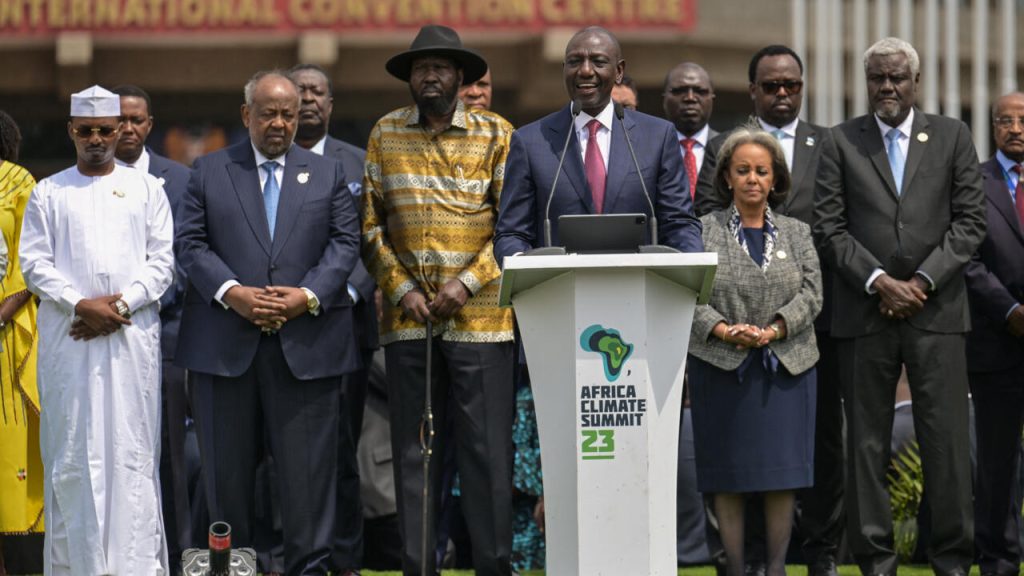From Declarations to Delivery: Where Africa Stands Since the Nairobi Climate Pledge

President Wlliam Ruto of Kenya, Chair of CAHOSCC and other African leaders read the Nairobi Declaration at the close of the ACS23 in Nairobi
From Declarations to Delivery: Where Africa Stands Since the Nairobi Climate Pledge
In September 2023, the Africa Climate Summit (ACS) made history. Hosted in Nairobi, it delivered the Nairobi Declaration—Africa’s bold and unified blueprint for climate-resilient development. It wasn’t just a political statement; it was a new contract with the continent’s future—one rooted in equity, agency, and ambition.
Nearly two years later, AfCEN has led the first continental stocktake to answer a critical question: Are we delivering on our promise?
With over 400 experts contributing across seven thematic areas, the findings are a wake-up call and a call to action. Progress has been made—but we must move faster, deeper, and more inclusively to meet Africa’s climate and development goals.
Climate Finance: Momentum, But Not Yet a Tipping Point
Africa’s climate finance flows grew by 48% between 2019 and 2022, reaching $43.7 billion. Private sector participation also doubled, but still comprises only 25% of the total—far below the level needed to unlock scalable climate solutions.
New tools have emerged: carbon market frameworks are underway in 14 countries, and innovative bonds in Rwanda and Côte d’Ivoire signal increasing financial sophistication. However, limited fiscal space, low credit ratings, and high debt servicing costs continue to constrain investment.
Efforts to reform the financial architecture—from Special Drawing Rights reallocation to debt pause clauses—are promising but slow-moving. The reality? Africa still needs four times more climate finance annually to meet its 2030 targets.
Adaptation: Resilience Rising, But Funding Falling Short
The Loss and Damage Fund was operationalized in 2025, but Africa has yet to see a single approved project. Meanwhile, climate shocks are intensifying.
The Africa Adaptation Acceleration Program (AAAP) has strengthened resilience for 60 million people, and early warning systems now reach 20 countries. Yet, fewer than half of African Union (AU) members have updated their National Adaptation Plans.
There is growing inclusion of Indigenous knowledge and marginalized groups, but adaptation remains underfunded and insufficiently integrated into development strategies.
Nature: From Marginal to Mainstream—Slowly
Africa’s biodiversity is invaluable—but under threat. The AU’s Biodiversity Strategy is in place, but only 8 countries have updated their action plans under the UN Biodiversity Framework.
About 19% of Africa’s landscapes and 17% of seascapes are now protected. Initiatives like the AFR100 and the Great Blue Wall are advancing, yet challenges persist: limited financing, weak monitoring systems, and insufficient gender-responsive planning.
A new frontier—natural capital accounting—is emerging, with 17 countries developing frameworks to revalue Africa’s true ecological wealth.
Energy: Powering a Just Transition

Solar panels harness clean energy, reflecting Africa’s push for renewable and accessible energy.
Mission 300, launched in 2025, aims to bring renewable energy to 300 million people. Africa’s renewable capacity now stands at 62 GW, with regional power pools gaining traction.
The Continental Master Plan for grid interconnection was activated, and clean cooking is finally on the global agenda—$2.2 billion was pledged in 2024 alone. Still, over 600 million Africans lack access to electricity, and clean cooking adoption remains stubbornly low.
Green industrialization is gaining ground through initiatives like APRA and the Africa Green Industrialisation Initiative. Yet unreliable power and limited storage still hold industry back.
Green Minerals and Manufacturing: Africa’s Leapfrog Opportunity
Africa holds up to 40% of global transition minerals. The African Green Minerals Strategy (2024) focuses on local value addition and resilience.
Green hydrogen projects are blossoming—34 planned across 7 countries—but 89% remain at concept stage. Meanwhile, Africa contributes less than 1% of global clean tech patents, a sign of urgent need for technology transfer and IP reform.
With the AfCFTA and smart industrial policy, the continent can become a hub for green manufacturing. But stable baseload power, trade incentives, and massive skills investment are non-negotiable.

A combine harvester works through a field of wheat, marking the peak of a harvest season.
Food systems remain a vulnerability. Agricultural yields are less than half the global average, and extension services are scarce—just one worker per 1,000 farmers.
Still, change is afoot: the ENSURE project, AI tools like Malawi’s “Ulangizi,” and cold-chain innovations are bridging productivity gaps. Africa’s largest food logistics hub is under construction in Lagos, and countries like Rwanda are scaling smart storage.
The Africa Water Investment Programme (AIP) has mobilized $7.5 billion so far—but needs $30 billion annually. Blue economy efforts are expanding, with marine conservation now a national priority in at least 8 countries.
Sustainable Infrastructure and Urbanisation: The Shape of Tomorrow

A striking view of modern city infrastructure, showcasing the innovative urban design vital for Africa’s climate-resilient future as outlined in the Nairobi Declaration.
African cities are waking up to the climate challenge. Nairobi, Kigali, and Accra are embedding green principles into urban design. Blended finance is scaling, with over $500 million committed to resilient infrastructure.
Green building milestones—from EDGE-certified museums in Egypt to sub-national offices in Kenya—are showing what’s possible. Electric vehicles are on the rise, with sales doubling in 2024 and EV markets expected to hit $28 billion by 2030.
Still, only 4% of municipal waste is recycled, and informal settlements remain vulnerable. Climate-smart urbanisation must become central to national planning.
Looking Ahead: From Stocktake to Breakthrough
Africa doesn’t lack vision. It lacks capitalized ambition. The Nairobi Declaration was the starting gun—but now the race is on.
With Ethiopia preparing to host ACS 2025, the message from this stocktake is clear: progress is real, but fragile. We must transform declarations into delivery—and fast.
AfCEN is committed to driving that shift—from policies to projects, and from ideas to impact.
Africa’s future is not something to be saved. It is something to be built. Boldly, collaboratively, and on African terms.
© Africa Climate and Energy Nexus. All Rights Reserved
2025
